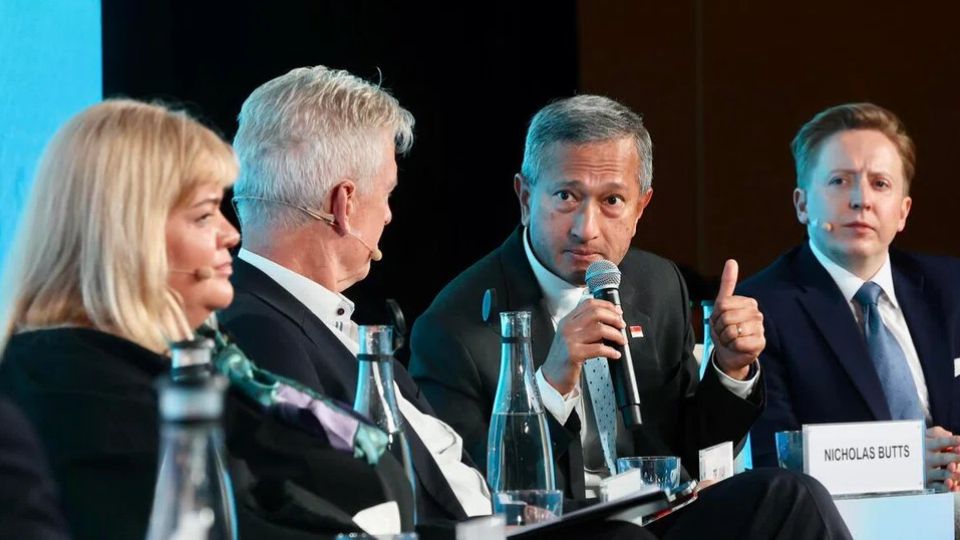October 24, 2025
SINGAPORE – International discussions about cybernorms must continue among nations, even those with different viewpoints, to avoid misunderstandings that can lead to costly mistakes.
Highlighting this rationale for Singapore’s approach to cyberspace discussions, Digital Development and Information Minister Josephine Teo said on Oct 23 that it is important that countries with divergent views hear one another out.
“It’s important when countries think about how they want to respond to issues, that they understand where the other side is coming from. If you don’t have the opportunity to hear people out, then you will have to make assumptions, and sometimes these assumptions are wrong,” said Mrs Teo.
She was speaking to the media in a round-up interview during the four-day Singapore International Cyber Week (SICW) Conference held at the Sands Expo and Convention Centre.
The 10th iteration of the cyber security conference saw 14,000 attendees from 90 countries and jurisdictions, including Russia, China, the United States and European countries.
There is no other conference that sees a gathering of these countries to discuss the issue of cyber security, said Mr David Koh, chief executive of the Cyber Security Agency of Singapore, which organised the event.
He added that over the course of the 10 years of SICW, conversations have shifted, and countries have realised that cyber security is not just an operational or technical issue.
“There are geopolitical considerations that have to be factored in as well, and Singapore’s ability to convene and bring countries who ordinarily don’t interact with one another… is significant,” said Mr Koh.
SICW offers countries the opportunity to have bilateral meetings away from the public eye, where they can highlight to their counterparts their most serious concerns, said Mrs Teo.
While such discussions may not always produce immediate solutions, they can promote better understanding.
Another benefit is being able to make a personal connection. “After that, we have each other’s phone numbers. You can contact each other when something happens and say, ‘Why is this developing in this direction?’” said Mrs Teo.
There are “no easy answers”, Mr Koh said, given that technology has advanced, with discussions now revolving around innovations such as cloud computing, agentic artificial intelligence and quantum computing, and how to leverage technology while guarding against harms.
“A lot of what we are dealing with are trade-offs. Different countries need to find different balances which are suitable for their own historical, cultural and political context,” he said.
With limited global agreements on binding cybernorms, some nation-states have been known to engage in cyber espionage and attacks.
Against such a backdrop, US and China have frequently accused each other of conducting cyber attacks, with the latest incident involving China alleging that the US had hacked its national time centre and caused severe damage to critical financial and telecommunications infrastructure.
In July, Coordinating Minister for National Security K. Shanmugam said Singapore’s critical infrastructure was the target of UNC3886, a cyber espionage group with links to China.
Subsequently, the Embassy of the People’s Republic of China in Singapore issued a statement rejecting UNC3886’s link to China. The embassy said China is firmly against and cracks down on all forms of cyber attacks, in accordance with laws.
Singapore’s Foreign Minister Vivian Balakrishnan also spoke at SICW, at a high-level panel on diplomacy on Oct 23.
He stressed the necessity of international cooperation and adaptive governance frameworks to address emerging cyber threats.
Saying there is a need for a multilateral approach, he emphasised the role of the United Nations, as it is still the only organisation that encompasses all state actors.
Dr Balakrishnan also highlighted Singapore’s contribution to the UN on cyber affairs.
Until July, Singapore had chaired the 2nd United Nations Open-Ended Working Group on the security of information and communications technology, which marked a milestone in global efforts to establish a common ground for responsible state behaviour in cyberspace.
At the conclusion of the working group, states endorsed an annual progress report that will help set up a permanent mechanism within the UN to house multilateral discussions on digital risks.
However, another panellist, Ms Helen Popp, Estonia’s Ambassador-at-Large for cyber diplomacy, noted that while the breakthroughs in the signing of UN agreements are encouraging, many underlying frictions were largely left unresolved – including how to balance sovereignty with the global nature of the internet.
Pointing out that malicious cyber activity is still taking place, she said states should face consequences for engaging in irresponsible behaviour in cyberspace.
In 2007, Estonia was the target of a coordinated cyber attack over 22 days that struck the Estonian Parliament, banks, ministries and newspapers.
“For Estonia, the topic of accountability is extremely, extremely important. We need to create transparent and meaningful consequences for malicious actors in cyberspace. We need to be able to talk freely about the attacks we are witnessing in our networks,” said Ms Popp.
Dr Balakrishnan said there will be difficulties in imposing rules on everyone, and suggested a system of transparency so that each country’s domestic electorate can better understand the decisions their leaders have taken in the cyberspace arena.
“Ultimately, politics is a local affair and by having transparency and making voters aware of the implications of your decisions, your designs, your technology and application of technology, I believe that political pressure could be brought to bear on leaders who hopefully do the right thing on a global stage,” said Dr Balakrishnan.

